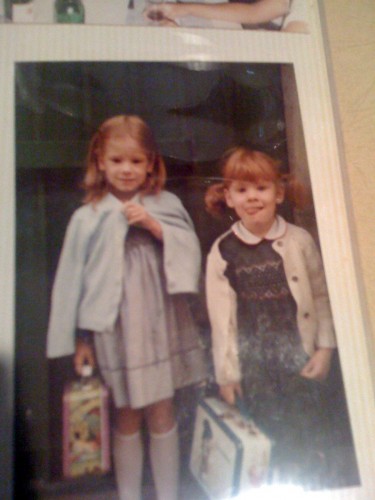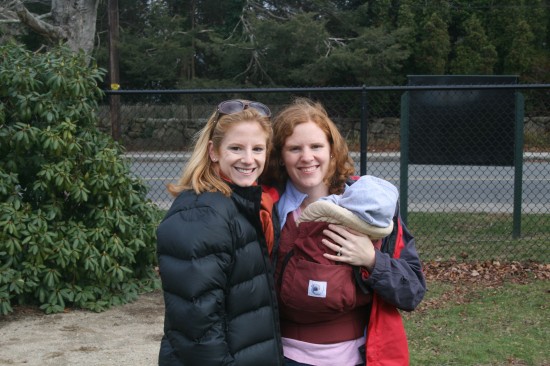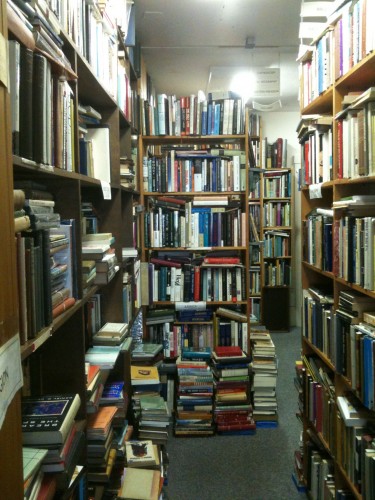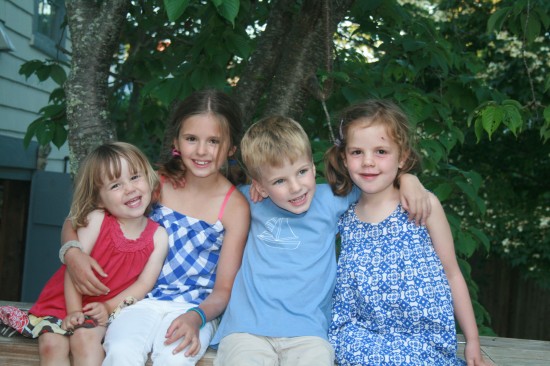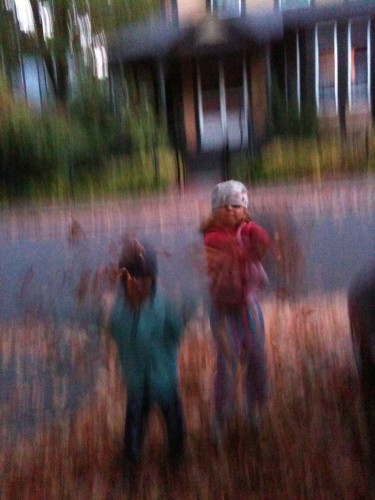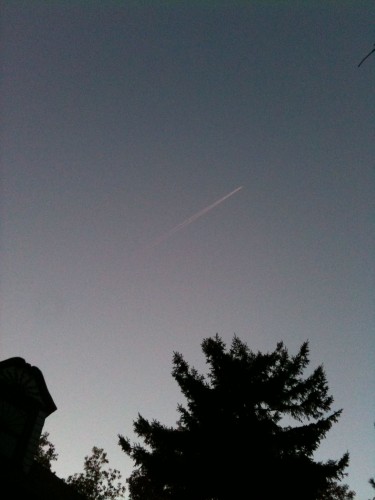
(the streak of an airplane in the gloaming, observed by Grace on our new tradition, the Noticing Things Evening Walk)
Yesterday morning I attended a talk by Jon and Myla Kabat-Zinn at Grace and Whit’s school. Having read and enjoyed Jon and Myla’s book, Everyday Blessings, I was eager to hear them in person.
Jon and Myla spoke for about an hour about mindful parenting and led the group through some very short meditation exercises. Much of what they talk about – engaging in this moment right now, the primacy of living in the life we already have, and honoring the everyday – is familiar to me. Despite how intimately I know the importance of these practices and the value of this way of being in the world, I still find it very difficult.
At one point Jon asked us to close our eyes and turn our awareness to our bodies, to the feel of our physical selves in space, on our chairs, in this room. I closed my eyes and felt my right hip aching, felt the slight tightness in my chest because my breath was not deep enough, felt the hairs on my arm as imperceptible currents moved through the room.
Jon went on, asking us to hear the silence, and Philip Larkin’s lines leapt to my mind: “And sense the solving emptiness/ that lies just under all we do.” Couldn’t that emptiness also be read as the silence Jon urged us to listen to? The silence that is there all the time, underneath, supporting all of the rest of our life’s chaos. Beneath all of the frantic attempts to avoid the awareness, beneath the noisy thinking that distracts, beneath the shuttling between past and future to avoid staring into the sun of the present: silence.
It occurred to me, not for the first time, that awareness is not my problem – if anything I’m too aware, too porous, too open to all of the world’s input and stimulus. What I’ve been wondering all day is if I developed my distracting monkey brain as a way of escaping the intensity of this awareness. Is thinking, for me, a way of avoiding feeling? I am instinctively, naturally aware – hyper, incredibly, viscerally aware. Maybe my life has been a series of exercises to try to circumvent the sharpness that this awareness can bring. Of course this awareness carries tremendous gifts, soaring joy and feelings so strong I am on the edge of bursting. But it also trails with it sadness, and loneliness, and the brutal, inescapable truth of impermanence.
I’m so fortunate to have thoughtful, engaged readers, and one of my favorite things is hearing from you. At least ten times, and probably more, individual people have sent me (in comments and in personal emails) the same passage by T. S. Eliot. The frequency with which I receive it cannot be dismissed as random coincidence. It’s more like a chorus from the universe, and thank you to all of you who have participated in its chant.
The passage has long been one I’ve loved, too, but today I heard it a new way. Once again, you all knew something before I did: my journey, chronicled here in such exhausting detail, is just back to where I started. What I am doing is chronicling my slow, halting, back-and-forth circling back to the very place I came from. It’s to learning to live with – even embrace – the grandeur and terror that comes of the sensitivity and awareness that is an essential part of who I have always been.
We shall not cease from exploration.
And the end of all our exploring.
Will be to arrive where we started.
And know the place for the first time.
(T.S. Eliot, Four Quartets)
A repost from almost exactly a year ago. Still very much on my mind. I guess you could say I am still engaged in the slow, halting, back-and-forth circling.

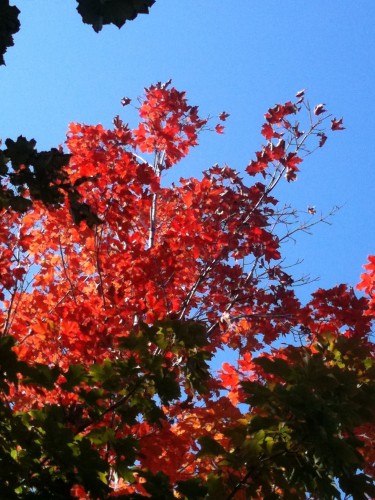 During September I got several signs from the universe to slow down. And then in early October, another. And so I listened. I took to my bed. For the first week of October I slept. Oh, wow, did I sleep. 8-9 hours a night, and naps every day. I was – and still am – exhausted. I turned inward. I didn’t write. I hardly read anything other than magazines. Mostly I rested in bed, and talked aimlessly to Grace and Whit, and rested in bed some more. And I cooked. I’m doing another cleanse, like the one I did this summer, but this time for a month. So I have to cook a lot. I enjoy cooking, so that’s okay, though the confluence of exhaustion with demands to be in the kitchen was a little daunting.
During September I got several signs from the universe to slow down. And then in early October, another. And so I listened. I took to my bed. For the first week of October I slept. Oh, wow, did I sleep. 8-9 hours a night, and naps every day. I was – and still am – exhausted. I turned inward. I didn’t write. I hardly read anything other than magazines. Mostly I rested in bed, and talked aimlessly to Grace and Whit, and rested in bed some more. And I cooked. I’m doing another cleanse, like the one I did this summer, but this time for a month. So I have to cook a lot. I enjoy cooking, so that’s okay, though the confluence of exhaustion with demands to be in the kitchen was a little daunting.